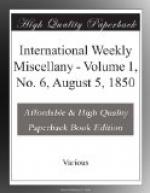“But within the last three years there has arisen in the United States a satirist of genuine excellence, who, however, besides being but moderately appreciated by his countrymen, seems himself in a great measure to have mistaken his real forte. JAMES RUSSELL LOWELL, one of the Boston coterie, has for some time been publishing verses, which are by the coterie duly glorified, but which are in no respect distinguishable from the ordinary level of American poetry, except that they combine an extraordinary pretension to originality, with a more than usually palpable imitation of English models. Indeed, the failure was so manifest, that the American literati seem, in this one case, to have rebelled against Boston dictation, and there is sufficient internal evidence that such of them as do duty for critics handled Mr. Lowell pretty severely. Violently piqued at this, and simultaneously conceiving a disgust for the Mexican war, he was impelled by both feelings to take the field as a satirist: to the former we owe the Fable for Critics; to the latter, the Biglow Papers. It was a happy move, for he has the rare faculty of writing clever doggerel. Take out the best of Ingoldsby, Campbell’s rare piece of fun The Friars of Dijon, and perhaps a little of Walsh’s Aristophanes, and there is no contemporary verse of the class with which Lowell’s may not fearlessly stand a comparison; for, observe, we are not speaking of mock heroics like Bon Gaultier’s, which are only a species of parody, but of real doggerel, the Rabelaisque of poetry. The Fable is somewhat on the Ingoldsby model,—that is to say, a good part of its fun consists in queer rhymes, double, treble, or poly-syllabic; and it has even Barham’s fault—an occasional over-consciousness of effort, and calling on the reader to admire, as if the tour de force could not speak for itself. But Ingoldsby’s rhymes will not give us a just idea of the Fable until we superadd Hook’s puns; for the fabulist has a pleasant knack of making puns—outrageous and unhesitating ones—exactly of the kind to set off the general style of his verse. The sternest critic could hardly help relaxing over such a bundle of them as are contained in Apollo’s lament over the ‘treeification’ of his Daphne.... The Fable is a sort of review in verse of American poets. Much of the Boston leaven runs through it; the wise men of the East are all glorified intensely, while Bryant and Halleck are studiously depreciated. But though thus freely exercising his own critical powers in verse, the author is most bitter against all critics in prose, and gives us a ludicrous picture of one—




